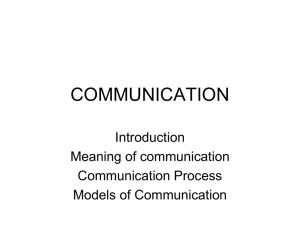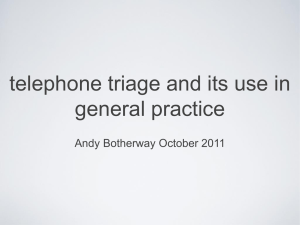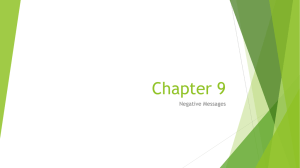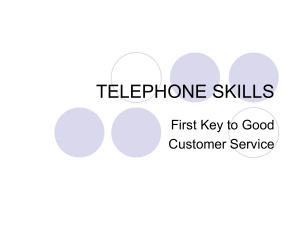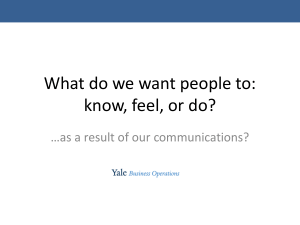Audioscript-unit-7
advertisement
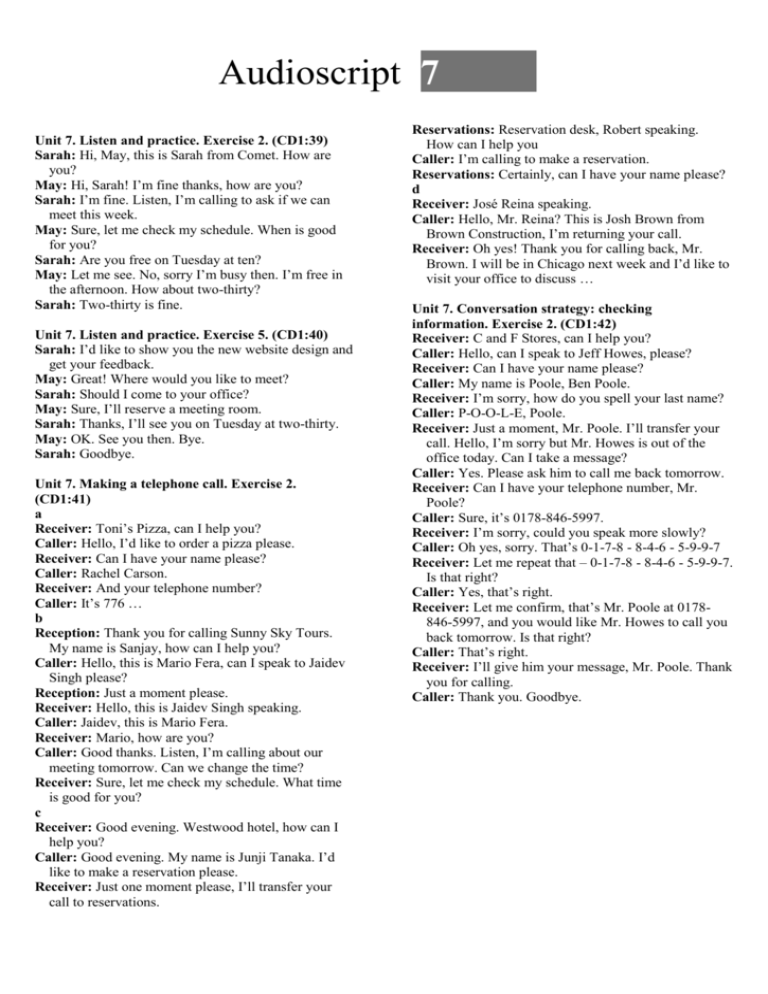
Audioscript 7 Unit 7. Listen and practice. Exercise 2. (CD1:39) Sarah: Hi, May, this is Sarah from Comet. How are you? May: Hi, Sarah! I’m fine thanks, how are you? Sarah: I’m fine. Listen, I’m calling to ask if we can meet this week. May: Sure, let me check my schedule. When is good for you? Sarah: Are you free on Tuesday at ten? May: Let me see. No, sorry I’m busy then. I’m free in the afternoon. How about two-thirty? Sarah: Two-thirty is fine. Unit 7. Listen and practice. Exercise 5. (CD1:40) Sarah: I’d like to show you the new website design and get your feedback. May: Great! Where would you like to meet? Sarah: Should I come to your office? May: Sure, I’ll reserve a meeting room. Sarah: Thanks, I’ll see you on Tuesday at two-thirty. May: OK. See you then. Bye. Sarah: Goodbye. Unit 7. Making a telephone call. Exercise 2. (CD1:41) a Receiver: Toni’s Pizza, can I help you? Caller: Hello, I’d like to order a pizza please. Receiver: Can I have your name please? Caller: Rachel Carson. Receiver: And your telephone number? Caller: It’s 776 … b Reception: Thank you for calling Sunny Sky Tours. My name is Sanjay, how can I help you? Caller: Hello, this is Mario Fera, can I speak to Jaidev Singh please? Reception: Just a moment please. Receiver: Hello, this is Jaidev Singh speaking. Caller: Jaidev, this is Mario Fera. Receiver: Mario, how are you? Caller: Good thanks. Listen, I’m calling about our meeting tomorrow. Can we change the time? Receiver: Sure, let me check my schedule. What time is good for you? c Receiver: Good evening. Westwood hotel, how can I help you? Caller: Good evening. My name is Junji Tanaka. I’d like to make a reservation please. Receiver: Just one moment please, I’ll transfer your call to reservations. t Reservations: Reservation desk, Robert speaking. How can I help you Caller: I’m calling to make a reservation. Reservations: Certainly, can I have your name please? d Receiver: José Reina speaking. Caller: Hello, Mr. Reina? This is Josh Brown from Brown Construction, I’m returning your call. Receiver: Oh yes! Thank you for calling back, Mr. Brown. I will be in Chicago next week and I’d like to visit your office to discuss … Unit 7. Conversation strategy: checking information. Exercise 2. (CD1:42) Receiver: C and F Stores, can I help you? Caller: Hello, can I speak to Jeff Howes, please? Receiver: Can I have your name please? Caller: My name is Poole, Ben Poole. Receiver: I’m sorry, how do you spell your last name? Caller: P-O-O-L-E, Poole. Receiver: Just a moment, Mr. Poole. I’ll transfer your call. Hello, I’m sorry but Mr. Howes is out of the office today. Can I take a message? Caller: Yes. Please ask him to call me back tomorrow. Receiver: Can I have your telephone number, Mr. Poole? Caller: Sure, it’s 0178-846-5997. Receiver: I’m sorry, could you speak more slowly? Caller: Oh yes, sorry. That’s 0-1-7-8 - 8-4-6 - 5-9-9-7 Receiver: Let me repeat that – 0-1-7-8 - 8-4-6 - 5-9-9-7. Is that right? Caller: Yes, that’s right. Receiver: Let me confirm, that’s Mr. Poole at 0178846-5997, and you would like Mr. Howes to call you back tomorrow. Is that right? Caller: That’s right. Receiver: I’ll give him your message, Mr. Poole. Thank you for calling. Caller: Thank you. Goodbye. Unit 7. Making an appointment. Exercise 2. (CD1:43) Conversation 1 Emily: Hey, Tom, how’s it going? Tom: Hey, Emily, pretty good. How about you? Emily: Fine thanks. Are you free on Saturday? Tom: Let me think. No, sorry I’m busy on Saturday, but I’m free on Sunday, why? Emily: Do you want to see a movie? I’d like to see Shane Comes Back. Tom: Sure, that sounds great! What time should we meet? Emily: The movie starts at seven-fifteen, so why don’t we meet at seven. Tom: Seven is fine. Where should we meet? Emily: Let’s meet in front of the movie theater. Tom: Great. I’ll see you in front of the theater at seven, then. Conversation 2 A. F.: Hey, Janet, do you want to go hiking on Saturday? Janet: I’m sorry I can’t, I’m busy on Saturday. A. F.: How about Sunday, are you free on Sunday? Janet: I’m free in the afternoon, is that OK? A. F.: Great! Let’s meet in front of the station. Janet: Sure, what time is good for you? A. F.: How about one-thirty, after lunch? Janet: That sounds great. I’ll see you then. A. F.: OK, see you later. Conversation 3 Peter: Hello, this is Peter speaking. Kate: Peter, this is Kate. How are you? Peter: Fine thanks, Kate, how are you? Kate: Pretty good. Listen, I’m calling to ask if we can meet next week to go over the project timeline. Peter: Just a moment, let me check my schedule. When is good for you? Kate: I’m free on Tuesday and Wednesday, when are you free? Peter: I’m busy all day Tuesday, but I’m free on Wednesday morning. How about ten o’clock? Kate: Is ten-thirty OK? Peter: Ten thirty is fine. Where shall we meet? Kate: I’ll reserve a meeting room on the 5th floor. I’ll send you an email with the details. Peter: OK, let me confirm, Wednesday at ten-thirty on the 5th floor, is that right? Kate: That’s right – thanks a lot, I’ll see you then. Peter: Yes, see you then. Thanks for calling. Kate: OK, bye. Unit 7. Viewpoints. Exercise 1. (CD1:44) Kay West, project manager, US Kay: I receive more than one hundred emails a day from our offices and plants all over the world, some are just for information and some need my action. Some are messages sent to everybody in the department or office; it’s impossible to read all of them so I just quickly read the titles. For most business I use telephones or teleconferences – it’s a quick and efficient way to get answers. I also use voicemail a lot, especially with our overseas offices where there’s a big time difference. Tran Chung Nguyen, Assistant sales manager, Vietnam Tran Chung: Of course I use the telephone everyday, and also email – although not as much, I guess I’m old-fashioned. For us human contact is still important in business. Face-to-face meetings show that we care about our customers, and help us to build a closer relationship. 90% of my time is spent talking to people in meetings. Talking to our customers about their families and their hobbies helps our business go smoothly. I think we’re a more relaxed culture – we don’t worry so much about time, we think people come first. Masako Mori, H.R. officer, Japan Masako: I use email a lot because it’s quick and easy to get an answer to my questions. If there’s a problem with a customer I use the telephone but I like email better. In face-to-face meetings everyone is very formal and it’s sometimes difficult to really understand what people mean. When I need to2 Level use English I always use email – I’m nervous about speaking English on the phone or in teleconferences because I don’t have time to think about what I want to say. My boss in America tells me to use voicemail, but I don’t think anyone here uses voicemail – I don’t know why – maybe we don’t like talking to machines?

